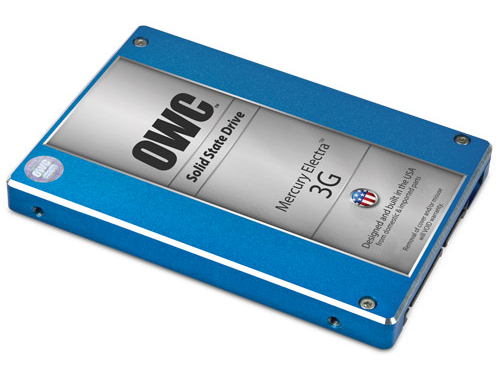OWC Intros Meaty 960GB 2.5-inch SSD
The hefty storage capacity in this SSD comes with a hefty price.
Got an extra $1,299.99 collecting dust on your desktop specifically set aside for storage? Then Other World Computing has exactly what you need: the OWC Mercury Electra MAX 3G 960 GB 2.5-inch SSD. That's no typo (this time): the company's latest SSD packs nearly 1 TB of storage in a SSD form factor that doesn't require a PCI-Express connection.
"This high-performance 3.0 Gb/s SATA Solid State Drive offers Mac and PC users maximum storage capacity along with the test-proven, award-winning performance of Mercury brand SSDs to meet real-world software applications demands," the company said on Friday.
According to OWC, the drive was designed specifically for mass storage uses such as A/V files, image libraries, and databases. It also features 7-percent over provisioning, Tier 1/Grade A NAND, and a handy three-year warranty. Even more, it utilizes SandForce DuraClass technology, meaning it offers up to 100x in data protection compared to ordinary SSDs and leading enterprise-class hard disk drives.
"By combining the highest level of Error Correction Code (ECC) and SandForce RAISE (Redundant Array of Independent Silicon Elements) technology, along with 7-percent over provisioning, the Mercury Electra MAX 3G 960 GB SSD provides RAID-like data protection and reliability without loss of transfer speed due to parity," the company said.
The specs state that it features two SandForce 2181 Series controllers, and offers sustained read and write speeds up to 254 MB/s and 250 MB/s respectively. Intelligent Block Management & Wear Leveling automatically distributes data evenly across the entire SSD, and Intelligent Read Disturb Management spreads the active read/write across the flash components, eliminating data corruption caused by constant use.
Compatible with Macs, PCs and external enclosures that utilize 2.5-inch drives, the Mercury Electra MAX 3G 960 GB SSD is available now from Other World Computing as well as through select retailers. Desktop users wanting to use the SSD can choose from one of five adapters OWC offers starting at $3 for utilizing 2.5-inch drives in 3.5-inch bays.
Get Tom's Hardware's best news and in-depth reviews, straight to your inbox.

Kevin Parrish has over a decade of experience as a writer, editor, and product tester. His work focused on computer hardware, networking equipment, smartphones, tablets, gaming consoles, and other internet-connected devices. His work has appeared in Tom's Hardware, Tom's Guide, Maximum PC, Digital Trends, Android Authority, How-To Geek, Lifewire, and others.
-
Shin-san Definitely better for servers in the case they are making. Media files on a desktop don't need that speed and you are better off using a magnetic driveReply -
nukemaster bdizzle11Sata II? How would they not make something this expensive sata III?With OWC being very Mac friendly(the main market they target), I would almost guess this is because the latest sandforce drives seem to fall back to sata 1.5gbps when used in Nvidia based Mac computers(I would guess Windows computers with the same chipset are affected the same way).Reply
This may be a smarter move then one would guess for anyone with an older Mac -
kracker, read the first line of the aritcleReply
Got an extra $1,299.99 collecting dust on your desktop specifically set aside for storage?
that seems like a reasonable price for it. -
bdizzle11Reply
Sata II? How would they not make something this expensive sata III?
see
With sustained reads up to 254MB/s and writes up to 250MB/s, up to 100X
the drive's advertise speeds dont even saturate sataII. -
dgingeri ReplyDesktop users wanting to use the SSD can choose from one of five adapters OWC offers starting at $3 for utilizing 2.5-inch drives in 3.5-inch bays.
$1300 for a SSD, and they wouldn't spring for an adapter. Wow, that's just douchbaggery to a whole new level.
